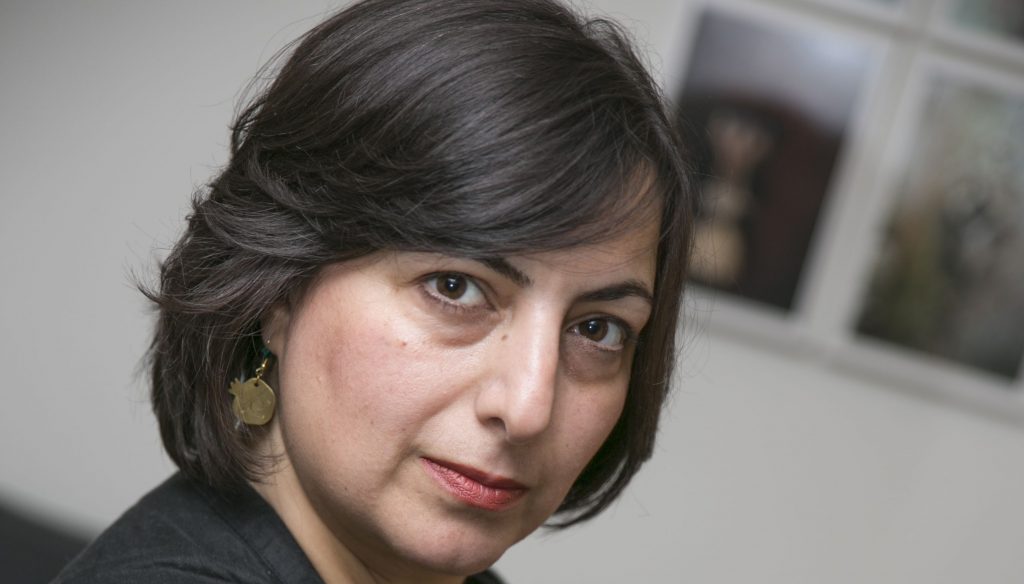Rights Activists Urge Rouhani to Nominate Women to His Cabinet

Asieh Amini, journalist and women’s rights activist. Photo by Javad Montazeri.
“If women were given the opportunity, they could show that they are equally capable and competent [as men] at serving in high levels of government,” journalist and women’s rights activist Asieh Amini told the Center for Human Rights in Iran (CHRI).
“We have many well-qualified women in politics, business, social services and cultural affairs who could handle being ministers or even the president,” she added.
President Hassan Rouhani, who was re-elected for a second term on May 19, 2017, did not nominate any women to his first cabinet. As he prepares to introduce his new cabinet to a more sympathetic Parliament for approval, his female allies are urging him to include women.
“Women are trying hard to have a presence in local governmental positions,” said Rouhani on June 25, 2017 during a speech to a group of women’s rights advocates.
“If a woman does not have local governmental experience, you cannot promote her overnight,” he added. “You have to move up step by step.”
A women’s rights activist responded in a tweet that holding women back has prevented them from gaining that experience.
“Rouhani says women have not been in high positions and therefore can’t suddenly expect to run a ministry. But why is it that we don’t have women in those high positions? Did women refuse to accept them, or were they prevented?” said Marzie Rasouli on June 25.
Based in Norway, Amini, one of the founders of the Stop Stoning Forever Campaign, told CHRI that Rouhani failed to produce policies that would benefit women.
“In his last government, Rouhani did not make women’s issues his priority, but I believe we had good signs of progress especially in rural areas,” she said. “For instance there has been tremendous growth in women’s participation in local governmental affairs in Sistan and Baluchistan Province.”
Continued Amini: “One would expect that the government would take a stand against discrimination and prove its support for women’s presence in all areas, but unfortunately, that has not been the case regarding sensitive posts.”
“Rouhani has not shown the strength or will to pay a price on this issue,” she said.
In Iran’s city and village council elections, held on the same day as the May 19 presidential election, voters elected 415 women to local councils in Sistan and Baluchistan, up almost 45 percent from the 185 who were elected four years earlier.
More women serve in local governmental positions in the southeastern province than anywhere else in the country.
“I don’t believe Mr. Rouhani when he says we don’t have enough competent women,” Amini told CHRI. “For instance, Elaheh Koulaei has all the qualifications of a stateswoman who could easily sit in Mr. Rouhani’s place.”
Koulaei, a professor of international relations at the University of Tehran, previously served as a member of Parliament from 2000-04.
“But there’s a lack of vision in seeing women’s equal level of competence,” continued Amini. “Politicians give lip service about gender equality until they have to make sacrifices.”
Women in Iran are not legally or constitutionally prohibited from serving in top government posts. Rather, their main obstacle is the country’s powerful religious establishment, which opposes women exceeding their traditional roles as wives and mothers.
Still, Rouhani’s conservative predecessor, Mahmoud Ahmadinejad (2005-13), nominated three women to serve in his second cabinet.
Marzieh Vahid Dastjerdi received the Parliament’s vote of confidence as minister of health, but Fatemeh Ajorlou and Sousan Keshavarz were rejected for the ministries of welfare and education.
“We don’t have political parties and organizations in any real sense and that’s a big problem,” Amini told CHRI. “This has caused a shortage of trained politicians among men as well as women.”
“But men are always given opportunities in the lowest to the highest levels of government while women are not,” she added.
The Rouhani government’s most senior female official, Vice President for Women and Family Affairs Shahindokht Mowlaverdi, stated a month before the presidential election that Rouhani would introduce “two or three women” to his second cabinet.
“Introducing women into the cabinet has been one of Hassan Rouhani’s goals and right now it would be unjustifiable if he did not do so,” she said on April 18, 2017.
Islamic feminist scholar Jola Movahed Shariat Panahi has also urged Rouhani to nominate women to his cabinet.
“Mr. Rouhani could nominate at least three women to lead the ministries of health, education, and labor, among others,” she said in a June 2017 interview with CHRI.
“Parliament seems receptive and, God willing, MPs will give their vote of confidence,” she said. “We know there are many educated women with substantial expertise, so it would appear to be reasonable and logical to nominate three female ministers.”





